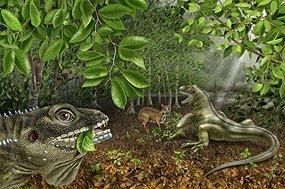
A giant lizard that lived 40 million years ago has been named after late rock singer Jim Morrison. Around 1.80 metres tall and weighing around 27 kgs, the plant-eating reptile was one of the biggest-known lizards ever to have lived on land. A fossil found in sediment in Sagaing district in Myanmar, has been dated to the late-middle Eocene period when Earth was so hot there was no ice at its poles.
Palaeontologists named the long-extinct species Barbaturex morrisoni. ‘Barbaturex’ means ‘bearded king’ (due to the ridges on the underside of the jaw that give lizards a beard-like appearance). ‘Morrisoni’ is in tribute to The Doors lead singer Morrison, famed for his fascination with reptiles.
These facts, combined with the lizard’s body size — about six feet long and 60 pounds — suggests that the comparatively smaller size of land lizards today is limited more by the cooler climate, and less by competition with other plant-eating mammals. “We think the warm climate during that period of time allowed the evolution of a large body size and the ability of plant-eating lizards to successfully compete in mammal faunas,” said Jason Head, a paleontology professor at the University of Nebraska-Lincoln who lead the team studying the lizards. If Earth warms up at a steady pace again, the climate could prove favorable to the allow such giant lizards to evolve again, but Head said the climate is changing too rapidly now for that to be likely.
The fossil was first discovered in the 1970s, but was not studied closely until recently. When scientists reexamined it, they discovered that the teeth resembled plant-eating lizards of our time, including iguanas. The results are set to be published this week in the journal Proceedings of the Royal Society B, and will help scientists to better understand how drastically Earth’s ecosystems and climate have changed over the millennia.
Credit : The Verge
Picture Credit : Google




